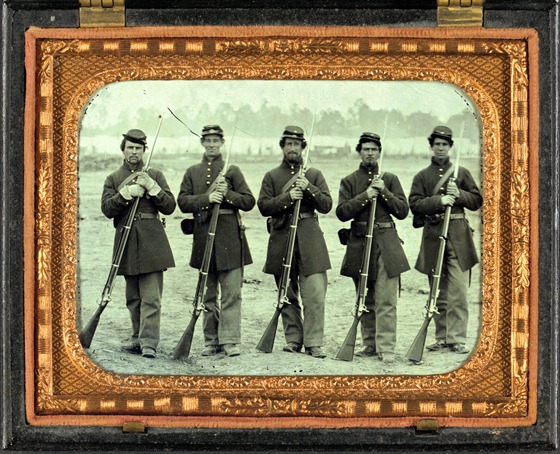Sharpsburg, Md., October, 1862.
Dear Sister L.:—
I always liked Steve. We tented together ever since we left Erie, and he was sensible. He is a queer, eccentric genius like his relatives, but he did not stay long. He was just out of the hospital and he fell out on the march. I’ve heard nothing of him since, so I went on alone again.
At Hall’s Hill our Tommy came back. Tommy Hopkins is an Irishman. He is now nineteen years old. At sixteen he came over alone, and now he has not a relative this side of the ocean. He came into our company a total stranger. Now no man in the company has more friends than Tommy. There is something so manly about him that no one can help liking him. No one could be more obliging, and now no one could receive a favor more easily than little Tommy Hopkins. At Malvern Hill he was terribly wounded. Dauntlessly he faced the foes of his adopted country, but a stern trial was in store for him. While loading he was struck by a Minie ball which cut off the forefinger of his left hand, went through the ball of his thumb and out at his wrist then in at his breast, and only stopped when it struck his shoulder blade. He refused all assistance and went a mile to the hospital alone. His wound was dressed. Next day, in all the rain and mud, he walked to Harrison’s Landing, ten miles. A brave young heart is Tommy’s. With no kind friends to write and soothe his pain while in the hospital, he still kept his spirits, and finally ran away from the hospital and came to us. Of course I welcomed him back with his stump of a hand and the great red scar on his breast. There is no other man in the regiment I like as I do Tommy. But he couldn’t handle a gun, so the colonel took him to headquarters for an orderly.
Well, then I got in with T. H., a bilious, crotchety, quarrelsome old bach. He is terribly profane, boasts of being selfish and everything else that is disagreeable. I tented with him till we came here and then I changed. My chum now is a quiet, inoffensive, obliging fellow, a new recruit by the name of Palmer. He sings, reads and talks through his nose like a U. P. preacher, loves everything good and hates evil, especially tobacco, which I don’t, you know. I am very well contented, however, with him. I was with H. In fact, I am tolerably contented with everything. Dennison taught me to philosophize and take things easy.











